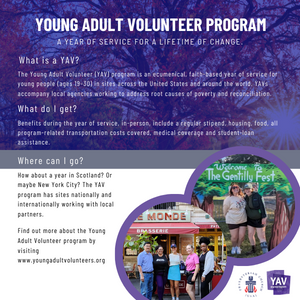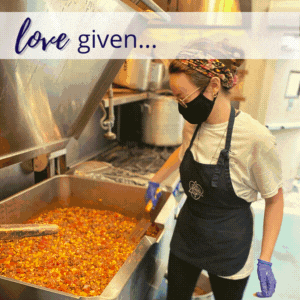by Linda Thompson, Catholic Volunteer Network Intern
“Great things come in small packages.” A creative idea and a small but very useful product have paved the way for a group of high school girls to earn money to pay for their school fees, to purchase supplies for this creative venture, and to save for their college tuition.
Soap on a Rope, an after-school project, is helping these young entrepreneurs fill a need in their community while also helping build their self-esteem. The unique feature of these bars of soap, made and sold by the girls in the program, is that they can be hung from trees or at the water pump. Their workshop is right in their school, St. Dominic High School, in Bomi, Liberia.
 |
| The Soap on a Rope project organizer, Rachel, and her helpers. |
The motivator and organizer of this soap-making project is Rachel Gillman, serving with Catholic Volunteer Network program S.M.A. Lay Missionaries. Rachel has established a working relationship with a steady buyer of the product – Mary’s Meals – a school feeding program that is a non-profit organization. Mary’s Meals buys the soap (230 bars of soap per month) to distribute to the schools in the surrounding area, such as Bomi, Gbopulu, Monsterrado, and Grand Cape Mount counties.
On a monthly basis, Mary’s Meals delivers not only rice but also one, five-inch cube-shaped bar of soap to each school. As Rachel explains, “no two soaps ever turn out the same size….but the soap can last the school for an entire month.”
A generous and initial donation was made by Rachel’s parents to buy the first order of supplies, including wood to make molds and plastic containers for mixing.
These fantastic cube-shaped blue bars of soap are made of a mix of “burnt” palm oil, water, caustic powder (NaOH), and blue dye. Why do they use the color blue? You may have already guessed the answer – to match the logo of Mary’s Meals. Adding to the special quality of these bars of soap is the scent of moth balls – a Liberian favorite.
The students make each bar of soap carefully, and the process is amazing. A piece of knotted clothesline is placed in the center of the soap before it dries, so that the loop comes out at the top of the bar. The students’ ingenuity – the clothesline with the loop – has served a very useful purpose. The soap can be hung from trees or at the water pump so that the children at the schools can easily wash their hands before eating, which helps to reduce intestinal worms and bacterial infection.
Each bar of soap costs $1.30; however, after the students achieve their quota of 230 bars per month, the extra supplies are utilized to make smaller-sized soaps. The buyers for these soaps, which sell for approximately $0.07 each, happen to be the members of the community where the students live.
Rachel Gillman and her talented and industrious students have had discussions about being more adventurous in trying other colors and interesting designs for their soap-making project. “We would love to increase the market base. This would allow more girls to be involved in the project. As Mary’s Meals expands, we are hoping to be able to expand with them. I encourage the girls to look for other markets as well” she said.
The amazing story behind this creative project is the entrepreneurs who are making it work. The small group of students Rachel Gillman works with is comprised of adolescent girls who face economic struggles to afford their school fees. These girls are eager to learn and are seeking to build a brighter future for themselves and their community.
“These are people who know the terrors of war and the devastation of poverty,” said Rachel. “It has been such a blessing working with these girls, and I believe they are doing well for themselves and for their county. They are examples to other young women in the school and community, and they encourage one another in their studies and activities.”


 Thousands of faith-based service opportunities can be at your fingertips with the RESPONSE. Download the latest edition today!
Thousands of faith-based service opportunities can be at your fingertips with the RESPONSE. Download the latest edition today!
